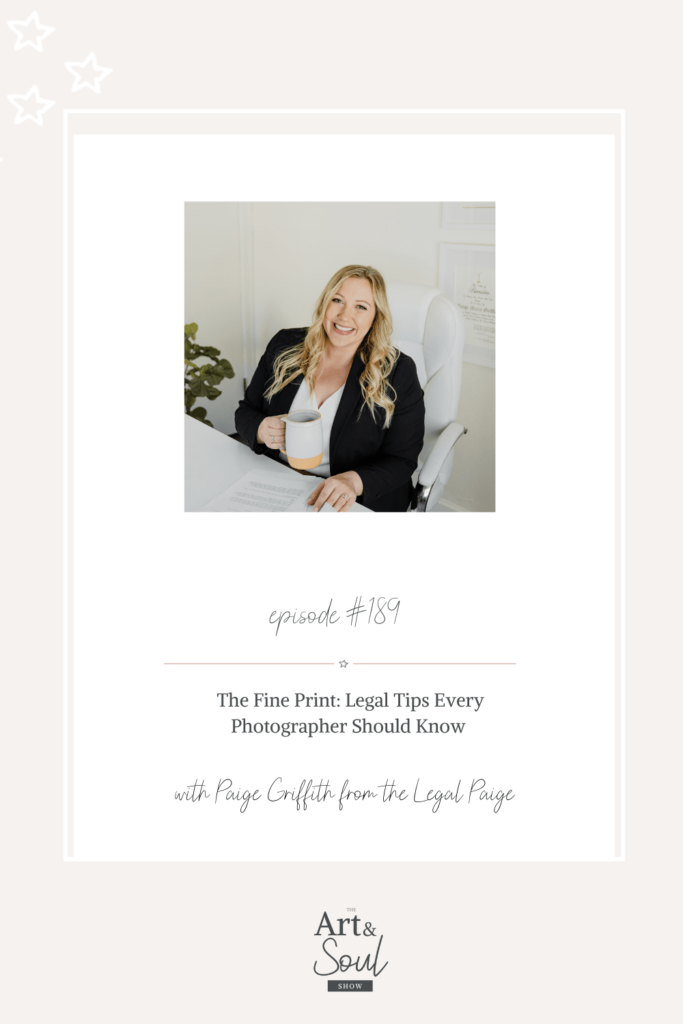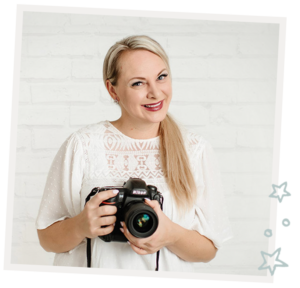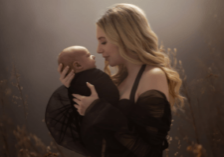The Fine Print: Legal Tips Every Photographer Should Know with Paige Griffith from the Legal Paige
Contracts can seem scary. The language might feel complex or overwhelming. But you truly do need them for your photography business. You have to protect yourself and your business and having contracts in place help you do just that. This is your nudge to get legal, my friends.

In today’s episode, I’m interviewing Paige Griffith, founder of The Legal Paige, a virtual legal educational platform for small businesses. Paige and I discuss contracts, model releases, trademark infringement, privacy laws, and negative reviews. We’re diving deep into it all to encourage you to cover yourselves legally.
Paige also shares how her love of photography was what led her to the niche of providing legal education to entrepreneurs.
What’s in this episode:
- [02:07] Paige shares how her love of photography led to finding her niche in entrepreneurship and law
- [05:54] Why it’s important for photographers to have legit, professional contracts for their business, plus how often you should be updating your contracts
- [11:56] Contracts can feel intimidating or too complex, but they don’t have to be
- [15:04] Some examples of when you would need a model release document signed, and why you shouldn’t use copyrighted/trademarked characters, themes, and music in your work
- [32:31] What photographers should know about data protection and privacy laws when handling their client’s information, plus what photographers need to know about the legal issues surrounding negative reviews
Tune in to this episode for why you need professionally written contracts for your photography business.
SUBSCRIBE: Apple Podcasts | Spotify
Meet Paige
Paige Griffith is the founder of The Legal Paige, a virtual legal educational platform for small businesses. She’s a certified juris doctor and holds a double B.A. in economics and political science. After working as a federal law clerk, Paige traded in her traditional law life for a virtual one and opened the doors to The Legal Paige in 2018. She helps her clients and online community run legal and protected businesses through her contract shop, podcast, YouTube channel and blog. Her mission is to create an online space where the law isn’t so scary and entrepreneurs can get legally legit in no time. Law aside, Paige is a Montana mom who loves hiking, lake time and a good game of Catan.
Connect with Paige
Listen to The Legal Paige Podcast
Follow The Legal Paige on Instagram
Join The Legal Paige Community on Facebook
Did this episode inspire you to get professionally written contracts for your photography business? Check out this episode Legal Advice for Photographers – Protecting Your Business Without Losing Your Heart with Rachel Brenke that offers you even more insight on finding alignment in your business!
Transcript
[00:00:00] Paige Griffith I always say you wouldn’t hire your sister to clean your teeth or look at your teeth when she isn’t a dentist, you’re going to go to a dentist. So why do we allow random people on the internet to write our contracts? It just doesn’t make sense to me. I want you to save money. But contracts are one of those things I don’t want you to cut corners on. I want you to get a legit one from the beginning because it’s literally the essential foundation for you and your clients.
[00:00:29] Lisa DiGeso Welcome to the Art and Soul Show, where we dive into heart opening chats on photography, business, life and that messy in between. I’m your host, Lisa DiGeso, a mom, a photographer and entrepreneur, and I’ll be sharing honest conversations and advice for photographers with insight on mindset, entrepreneurship and creativity. The goal of this podcast is for you to be able to gain insights and strategies that will get you real results. Because let’s face it, having a photography business can be lonely, but it doesn’t have to be. This is the place you can go when you need a boost of encouragement, a kick in the pants and inspiration to pick up your camera. This is the Art and Soul show. Hello, my beautiful friends. Welcome back to the show today. I’m super excited to dive into today’s conversation with Paige Griffith of The Legal Paige. Paige is the founder of The Legal Paige, a virtual legal educational platform for small businesses. She’s a certified juris doctor and holds a double B.A. in economics and political science. After working as a federal law clerk, Paige traded in her traditional law life for a virtual one and opened the doors to The Legal Paige in 2018. She helps her clients and online community run legal and protected businesses through her contract shop, podcast, YouTube channel and blog. Her mission is to create an online space where the law isn’t so scary and entrepreneurs can get legally legit in no time. Law aside, Paige is a Montana mom who loves hiking, lake time and a good game of Catan. Welcome.
[00:02:03] Paige Griffith Thank you. That was such a fun intro.
[00:02:07] Lisa DiGeso I love reading bios of guests. So I want to know how you got into like a passion of law with entrepreneurship because that is such a like needed area, because you see so many people doing so many things wrong. So how did you find your passion in this niche?
[00:02:26] Paige Griffith Yeah. So it all started from me being a photographer. Honestly, when I was in law school, I started a photography business because apparently going to law school full time and reading and writing all day long wasn’t enough for me. But really I just wanted a side project to really itch the creative side of my brain and work that and also have a little bit of extra income while I was going through school. Lo and behold, three years later, it kind of turned into a full fledged business, right? And I kind of dove into entrepreneurship head on. I loved going through the academia throughout my entire life and going to law school and, you know, definitely got all the accolades that I could and best grades and extracurriculars and, you know, went and worked for a federal judge after law school. But during law school is a really pivotal time for me because it allowed me to really see and this is, you know, I graduated in 2016, which feels like a long time ago. It is a long time ago. I’m dating myself. You know, during that time, I always thought I would just become a trial lawyer and, you know, do the partner track at a firm. And because I was blessed with the world of entrepreneurship and talking to people in the photography world and wedding industry world, and I went to conferences and events and really tried to immerse myself as much as possible. While I had some flexibility in law school, I went into my federal clerkship really not knowing what I was going to do afterward. It was this perfect transition period for me to really decide do I want to take, you know, the photography full on? Is that the world that I want to be in? And all the while I was still talking to people. I was a lawyer at that time. You know, people were asking me legal questions and it all just came to fruition where I was like, I can do both. I can marry both my passions and I can help creative entrepreneurs with the legal side of their business while also understanding the legal side of their business. Because I am one and that’s how I started the legal page. It was just, you know, a small little blog to start, and from there it’s turned into a very large contract shop and just lots of speaking opportunities, lots of educational resources out there, of course, for free from the legal page. But I do lots of guest experting in people’s masterminds and things along those lines, too. So I’m really doing what I’m super passionate about every single day and I love it so much. So that’s kind of the unique background I have. I’m a lawyer, but I’m also a creative just like you.
[00:05:12] Lisa DiGeso I love that. Do you still shoot much?
[00:05:15] Paige Griffith Yeah, I do. It’s definitely more of a hobby now because this is a full time business and I have, you know, ten plus employees and contractors on any given day, but I still like to do it, so. It’s not as full time as it is because I don’t know how people balance two full time jobs. I just really don’t. But people do it, and I’m like, Power to you. I also became a mom, and with that I definitely wanted to take a step back from having my weekends being super full with weddings and portrait sessions. So yeah, I just do it as a hobby now, but I still like to, you know, keep my hand in the cookie jar, so to speak. Yeah.
[00:05:54] Lisa DiGeso I love that. I love that. So I want to really dive in and talk about contracts because I think it’s such an important thing for family and portrait photographers in business operations. Now, can you maybe explain why they should have a lawyer drawn up and not just one they find willy nilly on Pinterest, on the Internet?
[00:06:13] Paige Griffith Yeah. So lawyers are specialized in certain legal fields. It’s very similar to doctors, it’s very similar to dentists. It’s very similar to CPAs as well that specialize in various, you know, parts of taxes. Lawyers are trained to write you a contract specifically, and entrepreneurs and photographers in particular. You know, we all have various ways of doing things, but there’s a lot of industry standard. There’s a lot of, you know, client risks and liabilities that are very familiar to photographers. And there’s a lot of things you need in your contracts that someone else wouldn’t need, right? Like a graphic designer isn’t going to need something that you would need in a photography contract. So lawyers are professionals. They are trained to write contracts and they will make sure that your contract is valid and enforceable in court or if a legal dispute were to ever happen. Also, contract lawyers in particular, and I think we all kind of know this, right, Like you’re not going to go to a transactional lawyer if you have a family matter. Right. Like you’re going to go find a divorce lawyer because they specialize in that. Lawyers are all trained to do very specific things, and general lawyers don’t really exist except in like very, very rural small towns, contract lawyers in particular. Like all we do day in and day out is think about legal language and clauses and provisions, and we keep up to date on case law and what’s happening in the industry. And you know, what are people dealing with clientwise or what are clients having confusion with? And how can we make this provision a little bit more clear or what legal language do we need to add pursuant to this case that just came out or world happening that occurred? We all know this. You know, post 2020, a lot of things changed with force majeure provisions, so on and so forth. So it’s just important. Yes, you can find one on the Internet. Yes. You could get one from your colleague or friend in the industry. But do you know that it’s good? Do you know that it’s up to date? All of those? Probably not. I always say you wouldn’t hire your sister to clean your teeth or look at your teeth when she isn’t a dentist, you’re going to go to the dentist. So why do we allow random people on the Internet to write our contracts? It just doesn’t make sense to me. But for some reason, the legal world is very different than all these other professionals. But when you when you go to court, like you have to hire an attorney, that’s really your only option unless you want to represent yourself. And that’s probably not going to go well. So I feel.
[00:08:52] Lisa DiGeso I watch Judge Judy, that’s never ends well.
[00:08:54] Paige Griffith It never ends well. The legal side of running a business is so interesting to me because there is a lot of DIY, there is a lot you can do as a solopreneur or someone who has a very small team. And I want you to do that. I want you to save money. But contracts are one of those things I don’t want you to cut corners on. I want you to get a legit one from the beginning because it’s literally the essential foundation for you and your clients 100%.
[00:09:23] Lisa DiGeso It’s almost like when they they get good glass, they get like, get good glass, get a good lawyer, they invest. Those are the things you need to invest in. Now, how often would you say you should be updating your contracts?
[00:09:36] Paige Griffith Well, updating contracts, you’re going to have your base contract and it’s going to be, I always say, like do a DIY contract audit every year. And that’s just really for yourself. It’s usually kind of an end of the year type of thing. Lots of people have a slower season come, you know, January, February or, you know, sometime in December as well. It’s a good time to look at your contract and be like, Has anything occurred with clients this year that I just need to finesse the language or add in additional language so it’s more clear to future clients on what my business policies are surrounding X and then updates our contracts here at The Legal Paige. It was one of my main things that I wanted to do when I started was I like to think of contracts as living documents. And so because a lawyer should be looking at what’s going on in the industry, what’s going on with case law, if anything comes up that we need to change in a contract template that we have in our shop, you get an automatic update so it’s included in the price. I’m not going to make you pay more and I want you to have a living document so that if we make a change, you can make the change too. And that goes widespread for everyone who say has purchased like the family photography contract. If there’s an update in there, like we’ve had a lot of them on cancellation, rescheduling, force majeure. We’ve had a lot on fees and retainers as well when there’s been some, you know, changes with retainers and the word deposit and things along those lines and then gas. That has been an interesting one. So travel fees has been something that’s been coming up the past couple of years. So if we ever make even a very small change, you get an update to the contract. So your lawyer should be telling you when you’re updating your contract. That’s my answer. And then you should also be looking at your contract from your business policy and your client experience perspective, because you may need to change something based upon how maybe you’re changing the way that your business operates or the way that you’re charging clients or working with clients or offering sessions or delivering, you know, their assets online to them. That would be totally different from a photographer in town that you know. So two parts there.
[00:11:56] Lisa DiGeso Love that. I think with contracts, I know that it often really contains that complex language and it does feel really intimidating for photographers to do that, but also to present that to their clients because it feels like, I don’t know, it almost just feels like too serious or a bit scary maybe. So I how can we make it legal without making overwhelming?
[00:12:19] Paige Griffith Yeah, I mean, contracts should be written in plain language. So if you have a contract that has a lot of legal jargon, I like to call it legal mumbo jumbo, that’s probably better wording for all of us. If you’re confused about your contract, I can guarantee your clients are confused about your contract and altogether there’s no meeting of the minds there on what that provision actually means. So why is it in your contract? Make sure that you understand your contract. Because your contract is only as good as your willingness to enforce it. And you can’t enforce a contract that you don’t understand. So just be sure that basically everything from that, if we’re going to take a top down approach to contracts, the top portion is going to be the most important information to your clients because we’re sending these contracts online, right? We all sign them, signed contracts online all the time. We know we’re going to look at the top of the contract a little bit more. We’re going to look particularly for like clauses that we care about. So if you’re a client, you’re going to care about fees, you’re going to care about what you can do with images, you know, like copyright. You’re going to care about when you’re getting your images and you’re going to care about, okay, the what ifs like if I need to cancel, if I need to reschedule, all of those clauses need to be at the top of your contract. You need to make it organized. Again, it’s really simple. Like if you have a contract, that’s just a lot of words and it’s hard to navigate through. It’s going to be hard to understand, and your clients aren’t going to understand it. So make it really, really easy for your clients to look at Section four that’s cancellation with a bold heading, and then you’re going to have a lot of specific things to what you do, right? So all photographers are going to have those clauses I just talked about. And then you might have some clauses that are a little bit different than other people based upon how you do business.
[00:14:13] Lisa DiGeso Yeah.
[00:14:14] Paige Griffith I’d say those are in the middle of your contract and then the complex legal language that you’re talking about or the ones that may not make a ton of sense to you but are probably really necessary to have in your contract are called general provisions or boilerplate language. And that’s going to be at the bottom of your contract. And honestly, you can, one, go to our podcast or our website, thelegalpaige.com, and get tons of information surrounding each of those clauses. Just type them in and it’ll tell you what they are. So as long as you understand why that’s there, then you’re able to effectively convey to your clients, if they have questions why you have that in there versus you just again getting a contract from somewhere and being like, Yeah, I think this is good. I’m not really sure what that means, but here you go. Hopefully that answers your question.
[00:15:03] Lisa DiGeso It does. It does. Would you recommend that a model release and a contract should be two separate documents?
[00:15:09] Paige Griffith You know, absolutely not. There’s, of course, very specific situations, family photography wise, that would make sense that you would do that. Yeah, but no model releases can just be clauses in a contract and honestly, just for ease of use. And for your clients to just sign one thing, it’s totally fine. They’re going to stand up the same. If it’s a singular four corner document versus a clause in your contract. If you’re worried about your model release clause, say you’re photographing minors or you’re a boudoir photographer or something along those lines, you could initial that clause just so they can take an extra peek at it. But for most, like basic portrait sessions, family sessions, it’s fine to have it in there. The one caveat that I will say is like lots of different families in one big family photo, so you might have to bring additional model releases for a legal parent or guardian to sign on behalf of the entire family. If you plan on using those images for marketing and advertising purposes, it’s the biggest mistake I see people make in the family photography world. I mean, your risk and liability is probably decently small. I tell people that right for someone to come after you and be like, Why did you put this online? But technically, legally speaking, if your model release is in your contract and it’s only signed by the person, that’s like setting it up, right? You’re going to have one person that’s like, Hey, I want you to take this family reunion photo. There’s going to be ten families in this photo. Like they’re not all going to be a part of that contract. One person is probably your contact person, so technically they can only sign a model release on behalf of their family unit. Yeah. And so I just always say, like, have one page or model releases with you that all of the families can sign. Again, that only if you want to use those photos, if you just want to keep those private, then you can do so and you won’t have to get a model release.
[00:17:15] Lisa DiGeso What about in a situation? So you’ve got a client and the parents are divorced and so you’ve got the mum brings the children to the session with a new partner. They have a session and you get the model release and then you get contacted by the other partner saying, Why are my kids online? Or they want copies of this session?
[00:17:35] Paige Griffith Yeah, this is a really tricky question. We’ve had it come up recently, so I’m glad you asked me this question.
[00:17:43] Lisa DiGeso This actually happened to me.
[00:17:44] Paige Griffith Oh, interesting. Yeah. So if this were to happen, if you were to only have had one parent sign it, now the other parent or guardian is upset that their children’s images are being used for marketing and advertising online. You have to respect that. So you do either have to get their permission or take it down. And a lot of times it’s just you didn’t know, like you didn’t know that it wasn’t okay. And sometimes there is like implied consent with model releases and a lot of times it does fall under that. So, for example, taking a step back here, if you’re in that situation, we’ve got divorced parents. I mean, technically you do need both. Lots of times one legal parent or guardian can sign on behalf of their children for certain things. But for images and likeness being used online, usually both parents have to consent to that. So just understand that that could happen. And a lot of photographers, to be very frank and honest, just kind of take the risk and they wait until someone asked to take it down. If you want to do your due diligence, you might just want to like ask that person, like if their other parent consents to you using these images, or maybe do yourself a little bit of a solid and maybe use images where their faces aren’t necessarily in them if you’re going to use that session for marketing and advertising. So back to just like basic family sessions, too, it’s really interesting because implied consent actually occurs in every family session because most family photographers are only having the one parent that’s contacting them sign on behalf of the entire family. So, you know, say you have two parents and you have three kids and one of the parent is signing the contract. Of course, they can sign on behalf of the children there, but they technically can’t sign on behalf of the other adult. Right. So that other adult is basically giving you implied consent to have a model release, but they can technically revoke it because it’s just implied. So again, I would say the majority of photographers are doing this and it’s, you know, 9.9 times out of ten never an issue because they see the photos online. They’ve technically given you implied consent. So you have that argument on your side. But if they do ever come back and maybe they they break up later down the road or something does occur, then you might get into the situation you were saying, where you probably just have to not use those images.
[00:20:28] Lisa DiGeso It was funny because I had a gut feeling and I actually never posted them. This was a few years ago and I just had this funny feeling and I was like, I think I’m just this I’m not going to post this. And then sure enough, I got this message saying, you know, I found out that my ex had a session, I’d like copies of these. And I was like, I don’t think I can give you them. Like, we didn’t sign a contract, so if you’d like copies, you’re going to have to talk to her.
[00:20:50] Paige Griffith Yeah, 100%. Right. Always make sure that they’re dealing with that and you’re not involved in that. It’s been a thing. I’ve seen some divorce situations where, like, lawyers then get involved and they like go to both parties, but that’s technically not the case. Best case scenario is if you’re a family photographer, you have both parents sign. But I understand that that can get really complicated too. So you can still just do it. The way that I was saying, just be prepared for the whatever scenario to occur, and it probably will. But again, it’s not going to happen very often. So your risk there is pretty low.
[00:21:26] Lisa DiGeso Of that. So I want to talk about something that’s come up so much in my news lately, and that is the Barbie movie and it has been a huge this year. I am seeing so many Barbie themed newborn sessions and all sorts of sessions. Now I know that this can absolutely infringe on Mattel and Disney I know, has gone after creators themselves. So can you share why it’s important to not use copy written characters and themes in our work as creatives?
[00:21:55] Paige Griffith Yeah. So I too have seen photographers do like themed weddings like Marvel and Game of Thrones and Grinch sessions. We all if you if you’ve been around the photography world for a while, we hear about like the Grinch situation that went down with Dr. Seuss Enterprises, like basically sending cease and desist letters and it was this huge thing. So all of this falls under basic actually trademark infringement. So if you as a photographer know that your clients are doing a themed wedding with licensed merchandise, you need to know that you can’t post any of those photos afterward for advertising your business. Usually you just want to talk to the clients. If you, as the photographer though, are like putting on a Barbie themed shoot, you’re dealing with, you know, Mattel’s trademarks and intellectual property that they have not licensed to you. Same goes for the Grinch, where Dr. Seuss Enterprises sent a cease and desist letter to the photographer who gained a lot of notoriety over that shoot. Essentially, intellectual property is owned by these companies. They have trademarks. They have the ability legally to decide how people utilize and commercially exploit those marks. Usually it’s through licensing. So without a license, you can’t use it for advertising purposes for your commercial benefit essentially. So don’t do it. Not a good idea. If you are doing it, know it’s very, very, very risky. And these businesses, large, large corporations have massive legal departments and they’re looking for things all the time for them to be able to, one, get automatic damages from you because you infringe on their trademark that they own and you didn’t license it properly. So Disney is one of those that they go after people pretty quick. But Disney is also one that it’s pretty easy to get a license to use from them. So lots of photographers are signing contracts with them all the time. You know, limited restrictions on their commercial ability to advertise and market those images that they took. But sometimes they’ll allow you to maybe do it, but you can’t post it. So you just have to be really, really, really careful. There is a high risk of doing it and you’re basically putting your business on the line. Yeah. The one thing I would say is if again, so be careful with it. There’s also something called fair use and that would be a whole other episode to get into. And I want to be really clear that I am not a fair use copyright expert, but the actual like Barbie itself is trademarked. Copyright is the movie. Right? Right. Sections of things. And you can use like snippets of things for educational purposes or, you know, if you were to do kind of satire on that. So we’ve seen things, right? We’ve seen reels, we’ve seen TikToks on things along those lines. That’s fine. Like you’re not going to get flagged for that because usually it falls under fair use. But that’s in the copyright world and there’s like attorneys, that’s all they do day in and day out is fair use copyright work. We’re talking here more trademark infringement and it’s easy cease and desist for them to send. Like you can’t use Barbie, you can’t use that trademark to promote your own business. So just don’t do it. I just I wouldn’t recommend it. And if your clients, though, are wanting to do something themedwise and they just know, one, that you’re probably going to have some type of privacy clause in your contract because you won’t be able to use those images. And so just make sure you’re protecting yourself there and then make sure you have an indemnification clause. Because if someone sues you for your client session, they’ll be on the hook, not you, under an indemnification clause. So just a few things there. Again, we could talk about this for hours.
[00:25:52] Lisa DiGeso Forever. I think it’s fascinating.
[00:25:53] Paige Griffith But just kind of know like where you’re at. Are you in trademark land? Are you in copyright land? Like again, is it for your commercial benefit in some way? And if it is, you’re probably having intellectual property infringement issues going on.
[00:26:07] Lisa DiGeso Right. So if a newborn photographer was to take like a Halloween box that, you know, those boxes and they say Barbie right on the end looks like a like a Barbie box, and they put a baby in there, that would be a trademark infringement?
[00:26:21] Paige Griffith It could technically be trademark infringement. Yes. And it’s up to Mattel what they want to do, right? Yeah. I mean, we haven’t seen yet we haven’t seen a massive cease and desist come through at this point in time that I know of in the industry. I probably would have heard of it by now if this happened. So, you know, they are also weighing their legal department is weighing like what is the benefit of allowing people to do this. We’re getting more notoriety, more people are wanting to go see Barbie, and that’s kind of been their marketing and strategic business plan this whole time, which we all know of. So they’re probably weighing like, oh, okay, we’re going to let this like it is technically trademark infringement. If you have like the actual Barbie logo on it.
[00:27:02] Lisa DiGeso Actually says Barbie on it.
[00:27:03] Paige Griffith Yeah, Yeah. And that’s where, you know like if you’re having it look like it, but you don’t have the logo and you’re doing something similar, then you may not be in trademark infringement land. So again, I tell people like, try your best to not like use the logo that’s trademarked. But again, we haven’t seen anything yet. So when you asked this question, I was like, Well, it’s clear that like Dr. Seuss doesn’t want you to use the Grinch because they came after a photographer very, very fast. Disney comes after people pretty fast. Yeah. So it’s dependent on what the legal department wants to do. And Mattel is kind of taking the approach that like it’s a free for all. It’s just benefiting us, if anything. But it’s not to say they couldn’t. So if you don’t know, like what the line is there with the business and what direction they’re going to take again, gray area can’t really that’s totally the legal world and a lawyer answer for you but hopefully that just helps you kind of identify the risks of doing so. And you can weigh them and decide for yourself as a photographer what makes the most sense.
[00:28:05] Lisa DiGeso Completely. So when I was like maybe 22, I decided I was going to start like a Iot non transfer business. I’m doing like baby onesies. And so I was like, in like, I think it was even before Photoshop whatever I was designing them in. And I don’t mean the website. I had Beastie Babies on it, like in kind of like Beastie Boys. I got a cease and desist letter from Beastie Boys lawyers, like within like hours of putting it up. And after that I was like, I’m shutting this down. I’m terrified. But ever since then, it’s always in my head about like, what use can you use of these things? So I love that was just a great conversation on that because I got so much out of it.
[00:28:46] Paige Griffith Oh good. Yeah. Was you can’t usually like. Legally you can’t, but you just never know like how far they’re going to let you go. We kind of know this from the Eras tour this year as well. Yeah, like people making T-shirts. I mean, her lawyers are on top of it, like she owns so many trademarks. Yeah. And if you are infringing on anything for her business, like they are massive takedown things occurring. Yeah. So it’s just it’s really business dependent. And I haven’t seen something particularly with Mattel and people doing things, but it’s probably because there’s a little bit of copyright fair use going on if they’re, you know, replicating portions of the movie itself versus the actual trademark. And, you know, just be careful of like posting the trademark.
[00:29:31] Lisa DiGeso Yeah, love it. So can we talk a little bit about music when it applies into slideshows as well? Because that’s really changed a lot with the addition of Tik Tok and Reels. And right now it seems like an unregulated free for all. And I know that’s probably not the case.
[00:29:46] Paige Griffith Yeah, I mean, they’re trying to regulate it the best they can. So now we’re moving away from like trademark world to copyright world. And music is copyrighted by the artist and usually, you know, by the owner of that whatever music compilation as well. So there could be multiple owners to it is what I’m trying to say. We see this especially with like videographers in you know, TikTok real world so music that’s in the app libraries, right? Instagram, SoundCloud or whatever you can find on Tik Tok, that’s in their actual library. That’s fair game because the artists are usually working on a. Deal or the owners of the copyright are working out a deal with those platforms to get their music there. There’s a benefit to that, right? So they’re allowing these platforms to use the music. It’s when you’re uploading music that’s basically attached to your video that isn’t from those platforms, that becomes an issue. Again, it’s this is like so nuanced and it’s so case by case dependent. If you are one, just try to avoid doing that. Two, if there’s no workaround, make sure that you own a copyright license to use commercially for that sound bite and just be aware that you could potentially have it taken down. So yeah, we know that these social media platforms every day are taking down things. We’ve probably all had it happen to us, to be honest, where we put something up and then it’s taken down like a couple hours later. It’s probably because you’re in copyright violation and they don’t want to be sued by anyone, so they don’t want any liability. And even if you had like a commercial license to use it. But again, videographers are a little bit more aware of this issue because they’re making sure that they own a license to use of a soundbite or a song like in their actual film that they’re producing for their clients. Again, it is kind of a free for all. That’s like my answer here, but just be aware that it could be taken down if it’s not actually in there. So like social media managers are very, very careful of this. They’re trying to use sounds that they know Instagram or TikTok is allowing them to use.
[00:32:05] Lisa DiGeso Yeah, Yeah. And it’s interesting because it’s when you think that you do like your TikTok and then you pull it from TikTok and then you stick it on Instagram, you’re like, Oh, I should just be able to use this right here. And it’s like, Hmm, nope I can’t do that. You got to make it twice, girl.
[00:32:19] Paige Griffith Yeah, you definitely basically have to make it twice. You just have to put it to the audio that the Instagram sound library is allowing you to have.
[00:32:27] Lisa DiGeso Yeah, or download it without the music first. Do that.
[00:32:30] Paige Griffith Yeah.
[00:32:31] Lisa DiGeso So privacy concerns, you know, over the years have really become more increasingly important. And, you know, it’s something that we talk about a bit more. So what should photographers know about data protection and privacy laws when handling their client’s information?
[00:32:45] Paige Griffith Yeah, this is a big topic. I mean, this is a huge topic, one that I would encourage your listeners to educate themselves more on. We have lots of additional resources on privacy concerns at thelegalpage.com. So you know, if you like blogs.
[00:33:02] Lisa DiGeso We’ll send them there.
[00:33:03] Paige Griffith Yeah get a little bit more information there but to be short and sweet, if you have a website or you have an email list, then you’re getting one portion of a person’s personal information, their email. And so you need you’re required by law to have a privacy policy on your website. So website terms and conditions on your website is all about users, like utilizing your website. You’re disclaiming and putting people on notice of your intellectual property, right? So trademarks, copyrights, copy, imagery, anything on your website, design on your website, how they can use it. A privacy policy is one directed under the law, and it’s federally that says, okay, if I take your email address, kind of like the who, what, when, where, why? Like, why are we using this? What are we using it for? No, we’re not going to give it to third parties if there’s ever a data breach, like here’s what our business is going to do, so on and so forth. So just make sure that you have one on your website. We have these bundled together as something that you can purchase at thelegalpaige.com. It’s one of our most purchased contract templates because these are ones that are really actually legal heavy and they have to be drafted a certain way and then they’re just always linked to the bottom footer of your website. So that is the biggest concern that I want people to know about. And then also if you’re taking people’s credit card information, make sure that you’re using a secure payment purchasing platform. So you’re using, you know, something that’s data encrypted. If you’re using a CRM system, most photography CRM systems have all of this figured out in the backend for you. They’re going to have their own privacy policies surrounding this as well. And then, I mean, the last thing that I would say is, you know, depending on how much information you’re taking from clients, like that’s really the things I just talked about an email address. And then you’re relying on a third party payment platform that you use to process people’s credit cards or debit cards. Your liability’s really low here. You’re not you don’t really need to do more than this. But if you start a digital product shop and you start acquiring more information from these people as a mass like them, the more personal information you’re getting from people, the more you may want to look into more like cyber security insurance and things along those lines. So I’m going to stop there because I don’t want to overwhelm people, but just be very, very careful when handling people’s client information. Keep it in secure locations, ideally just in your CRM system online and pass on that risk and liability to another third party. That’s why I always suggest that’s why you pay these fees. Yeah. You know, the 3.5% credit card fees, like you’re putting the onus and risk and liability on that credit card company, It’s a good thing. Like, that’s a really good insurance policy for yourself at a very low cost. So definitely do that. And then again, email addresses. Don’t give them out to people, don’t share them with people. It’s solely for your personal business use.
[00:36:09] Lisa DiGeso Yeah, I love that. So important. So in today’s digital age, online reviews and reputation management are crucial. So can you share maybe any tips on managing negative reviews and potential legal issues surrounding them?
[00:36:24] Paige Griffith Yes, This question is one that comes up all the time because I think as business owners and I don’t know why as creative business owners and photographers in particular we’re very weird about bad reviews or like less than five star reviews. So every consumer has the legal right to post their own review of a business, whether it’s not five stars or whether it is, you know, bad from their perspective, as long as it’s truthful, they are not defaming or slandering your business. You’re just really emotionally attached to your business. Of course, there are situations when you could have just that one client that’s like going off the rails and there’s something going on and everything they’re saying is untruthful. That is different. But if it’s truthful from their perspective and they post it, they are legally allowed to do so under consumer protection. That’s why we can write reviews over any business that we use online. So the same goes for your clients. You know, managing them is a different issue. It depends on the platform. Sometimes if it’s completely untruthful and you need to take it down or you want to take it down, there might be steps to do so. Other things like a Google review, very hard to take down. All in all, if there is a review that you feel like you need to take action on, respond to it, but be kind. Kindness goes a really long way. Try not to put emotions into it. Try to be as professional as possible and explain your side of the situation. And oftentimes that’s the best you can do is have their review with a response. If you you’re probably not going to have a bunch of these. So don’t let it drag you down. You’re going to have a bunch of other five star reviews and those are going to be glowing. And we are all, as consumers, very aware of people writing reviews. And we can flag things like if you’re being kind in your response and you’re saying how it went down, from your perspective, an average consumer is going to be able to take both accounts and make sense of all of it.
[00:38:33] Lisa DiGeso Yeah, the average consumer has a good B.S. detector.
[00:38:37] Paige Griffith Exactly. So just remember, it is illegal to prevent someone contractually from writing a bad review. So you can’t put any of those like non defamation clauses in a lot of your contracts. That’s only business to business relationships and not a business to consumer relationship. So clients are consumers and they’re allowed to write reviews. So just be careful about sometimes you can restrict confidentiality things in like a settlement agreement. So if you’re in like a refund situation with a client, you can restrict the whole of, you know, what your guys’s come to terms agreement was at the end of the process or what occurred. Everything needs to be kept confidential. So that’s a way to like take down a review is if they’re divulging confidential information relating to how you settled that potential legal issue or resolved it together. But that’s different than, you know, a non defamation clause, if that makes sense. Lots of photographers just get those two confused. So just take non defamation clauses off the table. You can’t really have them in your contracts and you can’t really control bad reviews as long as those bad reviews are truthful from a consumer’s perspective, you can just do a couple of things on your end to hopefully help show your side of the situation.
[00:40:03] Lisa DiGeso There was a situation a few years ago that I saw unfold and I there was a photographer and I had had a session with this very, very large creator on Instagram. And the Instagram creator kind of went nutty and accused this photographer of infidelity with the husband and all the stuff. But the people, like all the followers, went and attacked this photographer’s page with all of these fake reviews and just like, try to take her down. So in that kind of situation, when it isn’t true, what would be the outcome? Like, what would you do? Like, legally, what can you do?
[00:40:40] Paige Griffith The lawsuit would probably happen from the photographer to the Instagram influencer. So there be a lawsuit there. Definitely. Probably some defamation and slander occurring. It could be a lot of defendants on the hook. But that’s a situation where you probably are going to get lawyers involved and have a lot of proof and then things are going to get taken down pretty quickly because they’re going to try to resolve it without paying a lot of money.
[00:41:05] Lisa DiGeso Yeah. Good, good. Are you ready for our lightning round?
[00:41:09] Paige Griffith Oh, sure.
[00:41:11] Lisa DiGeso Okay. Coffee or tea?
[00:41:13] Paige Griffith Coffee.
[00:41:15] Lisa DiGeso Most luxurious vacation you’ve ever been on?
[00:41:17] Paige Griffith Luxurious. I don’t go on a lot of luxurious vacations. I mean, Hawaii. I usually spend a little bit of money for my family to go to Hawaii, and we like to stay at a little bit nicer of a resort just to, like, get out of Montana. But I’m a true Montana, like, recreation person, so I’m like going out in the woods.
[00:41:37] Lisa DiGeso I love it. I love it. Favorite TV show as a kid?
[00:41:41] Paige Griffith As a kid. Oh, I don’t know. Anything on the Disney Channel.
[00:41:46] Lisa DiGeso Do you like to cook? And if you do, what do you like to cook the most?
[00:41:49] Paige Griffith Yeah, I do like to cook. I’m a I mean, right now we’re in the fall, so I’m just a big crockpot person. I’m like, they go for the best crock pot recipes. I’m a mom, too, so I don’t have time. But if I can make a good soup or good crockpot recipe, I’m all about it.
[00:42:05] Lisa DiGeso Seriously, I made beef stew last night, so. Yeah. Favorite guilty or not so guilty pleasure?
[00:42:13] Paige Griffith Ooh. Grey’s Anatomy with a bowl of homemade popcorn.
[00:42:19] Lisa DiGeso What is something you’ve accomplished as an adult that your younger self would be proud of?
[00:42:25] Paige Griffith Probably like working for myself and putting money away into retirement and just. I don’t know. Yeah. I’ve been really happy with, like, my career path and life path that I’ve taken, and I think that’s what younger Paige would be happy about.
[00:42:42] Lisa DiGeso Where do you feel most centered and happy?
[00:42:46] Paige Griffith Well, it depends on the time of day. My first thought was yeah, with my husband and my kid and, but a lot of times I feel very, very centered at our lake house or like on the lake, on our boat, just kind of anything that’s really away from just all of the stuff every day. Yeah. So away from my phone, away from TV. Just like being with the people that matter most in, like, a place that I feel very, very safe. Whether that’s my home or out recreating somewhere.
[00:43:22] Lisa DiGeso I love that. My parents have a cabin that doesn’t have cell phone or Wi-Fi. And I was there for four weeks this summer and it was amazing. Yeah. So what’s the best piece of business advice you’ve ever been given?
[00:43:40] Paige Griffith To not take business too seriously and to not sweat the small stuff. Like, let a lot of it go. If you are constantly thinking about the minutia, you’re never going to think about it like growth mindset and you know how your business is really helping people. Like, do what you’re passionate about. Don’t worry about the little stuff like it will all. It’s all figure outable.
[00:44:07] Lisa DiGeso Marie Forleo. So where can listeners learn more from you?
[00:44:12] Paige Griffith Yeah, we’re thelegalpaige.com. So P A I G E, to play on my first name, but it’s a page of all things legal. So we have a contract template shop there. If you’re looking for, you know, the main service agreement for your business or any type of additional like small agreements or different offerings that you may have as a photographer, we have a blog on there. So if you’re wondering like an answer to your legal question, we probably have it. We have hundreds of blogs. I also have a podcast. So you’re listening to a podcast now, which means you probably like listening to podcasts. If that is your way of getting information, you can go to The Legal Paige podcast and also on Instagram, if you just like tidbits of little legal information and in a fun, easy to understand way you can go find us on there as well. And then the last place is if you have one on one questions, I can’t answer those for legal and ethical reasons as an attorney, because I’m not your attorney and you’re not my client. But we have a really awesome open group forum in Facebook. So we have thousands of business owners that are in The Legal Paige community on Facebook. Just type it into the search bar and we’ll let you in and you can ask questions there. So myself and my legal team monitor questions there, and that’s where people get like real time answers to their real questions.
[00:45:32] Lisa DiGeso I love that. And we will include all of that information in our show notes. And also, you know, what I saw on your website? You now have Canadian contracts and stuff. I’m Canadian and I was so excited to see that. So that’s pretty awesome for a Canadian.
[00:45:46] Paige Griffith Yeah, we sure do. We have a Canadian lawyer that we partner with and she’s reviewing all of our contracts and making them convertible for Canadians to use for their business. There’s of course, some nuance provisions in there that we just want to make sure are applicable in your territory. So love that. That’s what we’re doing.
[00:46:02] Lisa DiGeso That’s awesome. So I love to end my interview. It’s just that last question and it is What are you currently curious about or artistically curious about?
[00:46:12] Paige Griffith Mm hmm. I surprisingly am very artistically curious. I mean, I just go to Photographer Paige Land here in a lot more of this, like documentary style family photography. I was very much just like a portrait photographer that wanted to get you the money shot when I was shooting. And just the the new age and wave of this, you know, beautiful. Like, I’m just going to capture your family and your life on how it is. I’m very attracted to that. So I’ve been doing some things on the side to just itch that curiosity and do some family shoots for friends here in town and kind of see what album and gallery I can come up with for them.
[00:46:58] Lisa DiGeso I love that. Oh, that’s wonderful. Well, Paige, thank you so much for joining me today. It has been such a pleasure talking with you. And you have just been a wealth of information for our listeners here. So thank you.
[00:47:10] Paige Griffith Yes, thanks. This was a fun convo. I appreciate you having me.
[00:47:14] Lisa DiGeso And my beautiful friends. I hope you love this conversation just as much as I have. I am sending you so much of my light and my love today and every single day. We will see you next time.
share the love
[Sassy_Social_Share]
recent
Podcasts

I'm
Lisa DiGeso
I’m on a mission to create uplifting online experiences for photographers ready to elevate their art, their business and their mindset.(...and have fun along the way!)
























